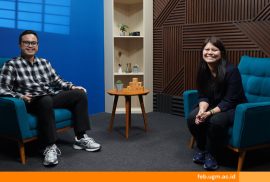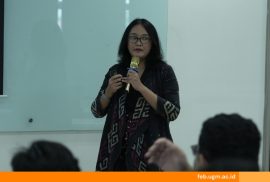The MD Research Forum (MD REFO) is a webinar aimed at scientific development and is held periodically by presenting lecturers at FEB UGM as speakers. On Tuesday (14/12) the 2nd MD REFO was successfully held with the topic “Pre-Employment Card and Axiology of Economics” and presented Denni Puspa Purbasari, M.Sc., Ph.D., Lecturer of the Department of Economics, FEB UGM as well as Executive Director of PMO Pre-Employment Card, as a speaker. By presenting speakers who work as academics and practitioners, it is hoped that they can explain the topic more broadly through two perspectives, namely in terms of theory and implementation.
Starting this scientific discussion, Denni explained about the axiology of economics related to the usefulness of science for human life, which must be able to overcome the economic problems of society and understand a phenomenon. The axiology of economics also contains values which, if associated with policy formulation, of course based on this theory there will always be pros and cons. This was then linked to the next discussion, namely regarding her role in the Pre-Employment Card Program.
Next, Denni discussed the challenges of employment in Indonesia. Although from year to year each Ministry institution has been given a budget to provide vocational education and training, the data shows that 90% of the workforce in Indonesia have never attended certified training. Based on the World Bank’s Perception Study (2016), the main reason workers do not attend training is the unavailability of appropriate training. Moreover, the presence of the Covid-19 Pandemic has had a major impact on Employment. Based on BPJS data, as many as 29.12 million people of working age were affected and 2.56 million stopped working.
Based on the problems of people who have no income and lost their jobs at the beginning of the pandemic, the Pre-Employment Card Program is used as a semi-social assistance solution which consists of two elements, namely training and incentives. What distinguishes the Pre-Employment Card from other training programs is that the Pre-Employment Card scheme gives the recipient the authority to freely choose and purchase training according to their individual needs. In addition, this program also conducts partnership schemes with e-commerce platforms such as Tokopedia and Bukalapak for the purpose of efficiency and ease of accessing training.
The Pre-Employment Card program has two missions, namely the mission of social protection and the mission of empowerment. As part of the Social Protection Program, Pre-Employment does not only provide fish, but also the hooks. This program can also be called cash plus because it not only provides cash, but also human capital development. The types of training offered by Pre-Employment include information technology, sales and marketing, languages, finance, and many more. Not only that, this program also provides information on job vacancies in accordance with the training that has been completed by the participants.
At the end of the discussion, Denni explained the results and impacts of implementing the Pre-Employment Card program for one year from 2020-2021. In total, there have been 11.4 million program recipients inclusively in 514 districts/cities. According to the results of an impact evaluation study by J-PAL SEA, there is an 18% increased chance for program beneficiaries to start a new job and also a 30% increased chance of owning their own business compared to non-beneficiaries. The factors that make this program successful are that Pre-Employment makes it easy (in terms of the process of registering, seeking information, and receiving money) and also providing options (free choice of training, digital platform, and payment method) for recipients.
Reportage: Kirana Lalita Pristy/Sony Budiarso.




